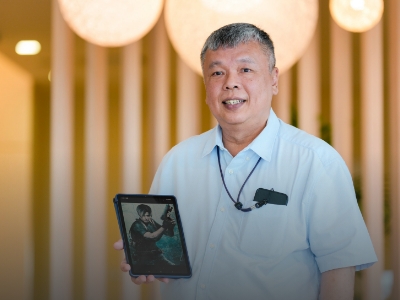Published on 21 March 2022
Greater convenience, saved travel time and costs, and lower exposure to infection: the purported advantages of teleconsultations are numerous.
Despite all the public attention it has garnered, however, the virtual service has so far only been accessible to a small proportion of the population. In addition, patients have had to deal with an unexpected hassle: toggling between different apps and platforms during a teleconsultation.
But things are set for change. In a first for the Singapore public healthcare frontier, teleconsultations – or teleconsults, for short – will soon be simpler and more readily available to patients, as the service is rolled out to NUHS institutions via the NUHS app
First launched in April 2021, the NUHS app offers a variety of functions such as the booking and rescheduling of appointments, bill payments and viewing of medical reports, and so on. Teleconsults will be the latest addition to the list.
“The introduction of the teleconsult feature is especially timely considering the COVID-19 situation,” said Ms Clara Sin, Chief Operating Officer, Group Service Transformation & Medical Records, NUHS. “We want to ensure continuity of care for all patients and save patients the trouble of travelling physically to the hospital, especially elderly patients. It also reduces crowding in clinics and allows us to maintain better safe distancing measures.
This is how an in-app teleconsultation works. It begins with an SMS reminder being sent to the patient before their virtual appointment. The patient registers via the app, to signal that they’re ready to be seen by the doctor. Subsequently, they’re informed of the virtual queue ahead of them, so they’ll have an indication of how long the wait time is.
Once the doctor is ready, the patient enters a Zoom meeting room for the consultation, which is carried out by video call. And after the session is over, the patient will receive another reminder to go into the app and arrange the delivery of medication.
Finally, the patient receives and pays for the bill, also within the app. “So the end to end journey is seamlessly completed, making the whole journey much easier for the patient,” said Mr Peter Forbes, Group Chief Digital Officer at NUHS.
So far, the service has only been available on a trial basis to a small number of patients in Alexandra Hospital. But plans are underway to introduce this feature to National University Polyclinics by February 2022, and subsequently at the National University Hospital and Ng Teng Fong General Hospital within the year.
This is especially as teleconsults continue to gain momentum amidst the pandemic. As of October 2021, over 6,500 teleconsultations are booked each month across NUHS institutions – but only 100 have been carried out through the app. The rest have been held through a mix of other means, including phone calls.
But as the service is rolled out to more institutions, the team envisages that about 80 to 90% of video teleconsultations will be moved onto the app. “But there’ll always be a place for phone consultations as well, as some patients may find that more convenient for their particular needs,” said Mr Forbes
Understanding the needs of each patient
Although the service shows much promise, the team is aware that not it might not be suitable for every patient.
Currently, teleconsults are not offered for first-time visits. Only established patients – patients with repeat visits, who doctors have already assessed to not require much physical examination – are given the option of teleconsults.
In particular, patients with chronic diseases like diabetes, hypertension, or stable heart conditions are suitable, said Dr Teng Gim Gee, Senior Consultant at Alexandra Hospital’s Department of Rheumatology.
“[But] patients who are hard of hearing or are visually impaired will not be suitable, for example,” she added.
There are exceptions. Sometimes, patients call in to request a teleconsult instead of an in-person one, in which case the doctor may assess the situation and decide whether to extend the service to them, depending on the patient’s needs.
In other cases, chronic patients may suddenly develop new, acute symptoms. If this happens, the doctor may advise the patient to switch from a teleconsult to a physical consult, Dr Teng said.
Furthermore, “we’re also mindful that not every patient is tech savvy,” said Ms Sin, citing the elderly as an example. In such cases, a caregiver can be appointed to manage their needs on the app.
“We’re also reminded that healthcare is unique because the human touch is very important,” she added. “As for patients, they can still contact us through our NUHS contact centre, or in person if they need to.”
A solution amidst the pandemic

The panel has observed that requests from patients to switch to teleconsults tend to increase whenever there is a peak in cases
This not only allows patients to avoid exposing themselves to infection outside their homes, but also cuts down on congestion in hospital waiting areas.
“So with teleconsults in the NUHS app, what we aim to do is to provide convenient access to remote care,” said Mr Forbes. “It saves on time off work and travel expenses for the patient, and it also provides the patient with visibility of the queue.
“Finally, it allows patients to have their consultation in the comfort of their own homes, avoiding crowded spaces during the pandemic.”
Find out more about the NUHS app.




